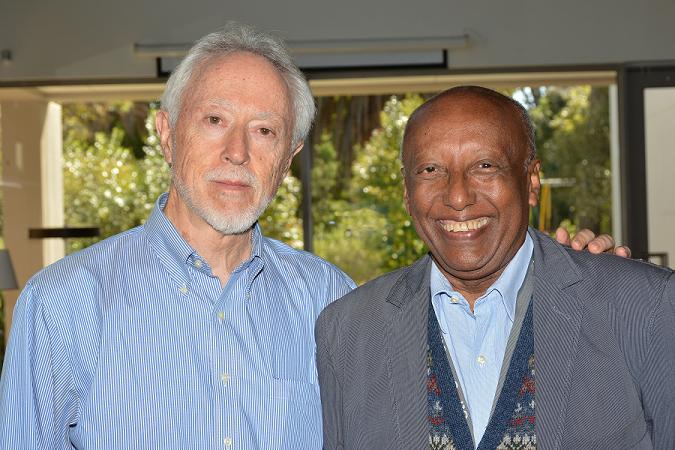
Photo: Anton Jordaan
“What are the qualities of a good (a plausible, even a compelling) story? When I tell other people the story of my life – and more importantly when I tell myself the story of my life – should I try to make it into a well-formed artefact, passing swiftly over the times when nothing happened, heightening the drama of the times when lots was happening, giving the narrative a shape, creating anticipation and suspense; or on the contrary should I be neutral, objective, striving to tell a kind of truth that would meet the criteria of the courtroom: the truth, the whole truth, and nothing but the truth?” asks Nobel Laureate J. M. Coetzee.
Prof. Coetzee presented extracts from his recent project, a written dialogue with the British psychoanalyst, Arabella Kurtz, on the subject of truth and fiction, to a packed seminar room at the Stellenbosch Institute for Advanced Study (STIAS). The work has already been published in Dutch and Spanish, and will shortly be published in English under the title The Good Story. Prof. Coetzee is currently an Honorary Visiting Research Fellow at STIAS where he is working on 51 Poets: an Anthology of World Poetry. He is professor in the Department of English and Creative Writing at the University of Adelaide.
The Good Story examines the stories we tell others about ourselves, the stories we tell ourselves, and the stories groups and nations tell.
Prof. Coetzee interrogates the individual’s relationship with his own life history and whether in telling our own story we should (or are even able to) tell the whole truth. “Given the wealth of material I hold in memory, the material of a lifetime, what should or must I leave out, bearing in mind Freud’s warning that what I omit without thinking (i.e. without conscious thought) may be the key to the deepest truth about me?”
My view of the past or just a view I happen to hold?
Prof. Coetzee points out that Freud (the founder of psychoanalysis) “is a great explorer of the lies we tell ourselves and there is a lot to be learnt from him.”
In his discussions with Kurtz, he asks whether the goal of psychotherapy is to reach an absolute truth or to reach a truth that allows the individual to heal and return to a functioning lifestyle. If the goal of therapy is to make people better able to love and work, does this not sometimes entail tacitly accepting their lies about themselves, rather than making them face hard truths? Is “a version of the full truth” not enough?
Discussing similarities between the storyteller or writer of fiction with the therapist, Prof. Coetzee pointed out that in both cases two parties are involved – writer and reader, therapist and patient – and a kind of contract exists between the two. “For parts of our lives,” he continued, “there is no record other than our own, sometimes fallible, memories.”
Prof. Coetzee extrapolated this discussion of the individual psyche and storytelling into discussions of the national psyche, and pointed to revisionist history where nations “revise the story they tell themselves. He pointed out that most of the time a consensus view of the past (a generally accepted way of talking about national history) reigns within groups. When there is movement, it is “from consensus to consensus”.
Author: Michelle Galloway
